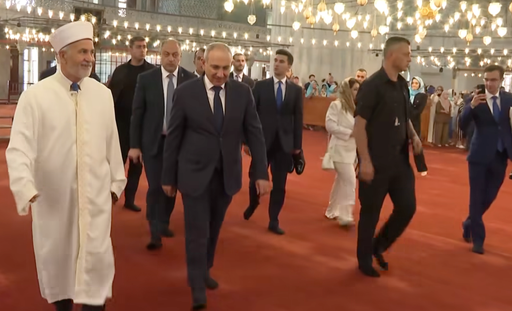Armenia’s government says it has foiled a coup attempt by opposition groups and Church leaders said to be against Prime Minister Nikol Pashinyan’s peace efforts with Azerbaijan.
The plot was also revealed barely a few days after Pashinyan visited Türkiye as part of his efforts to seek better ties with Ankara.
Authorities in the Caucasus nation of nearly three million people arrested Archbishop Bagrat Galstanyan on Wednesday. He is the leader of the nationalist opposition movement Holy Struggle, which opposes Azerbaijan’s sovereignty over the Karabakh region. Galstanyan is also a leading member of the Armenian Apostolic Church, the country’s most powerful religious establishment.
Tensions between the Church, its allies and Pashinyan have escalated since Armenia’s 2020 defeat to Baku in the Karabakh region, which returned fully to Azerbaijani control after a 23-hour offensive in 2023.
While Pashinyan seeks a peace treaty with Azerbaijan and normalisation with Türkiye, an ally of Baku, the Church’s top religious leader Catholicos Garegin II, and allies like Galstanyan oppose de-escalation with Armenia’s two Turkic neighbours. Rather, they blame Pashinyan for Yerevan’s defeats and have repeatedly called for his resignation.
The Church leadership, which has connections with Armenian diaspora and radical groups like Armenian Revolutionary Federation (Dashnaktsutyun), has sought to oust the government, says Kamer Kasim, a professor of international relations at Abant Izzet Baysal University.
“It appears that those anti-Pashinyan political groups backed by the Church orchestrated this coup attempt. Some former military and police officers apparently participated in the coup attempt,” Kasim tells TRT World.
“They (anti-Pashinyan forces) are desperate and they will try to do everything to stop the peace treaty with Azerbaijan and normalisation with Türkiye,” says Fuad Chiragov, a Baku-based political analyst. He adds that the Church-allied forces might even resort to violent tactics to overthrow Pashinyan.
Former Armenian President Robert Kocharyan, a leading opposition figure, has long opposed reopening the Armenia-Türkiye border, fearing it would turn Yerevan into Adjara, the Georgian region where Turkish trade and investment account for around 80-90 percent of foreign capital, creating significantly more wealth compared to other parts of Georgia.
Losing relevance
Most recently, Pashinyan visited Ankara, holding a critical meeting with President Recep Tayyip Erdogan, discussing possibilities of “the Armenia–Türkiye normalisation process, regional developments, and the importance of sustained dialogue.”

Pashinyan understands that without Turkish support, Armenia cannot prosper across Caucasia, says Zakhid Farrukh Mamedov, professor of international economics at Azerbaijan State University of Economics in Baku. But Pashinyan’s move has angered opposition groups, who fear losing their relevance in Armenian society, Mamedov adds.
As Kocharyan feared, opening borders with Ankara will potentially “transform Armenia into Adjara, pulling much investment from both Türkiye and Azerbaijan,” Chiragov tells TRT World.
The prospect of this prosperity makes the anti-peace camp “afraid” of any kind of normalisation with Azerbaijan and Türkiye because that would damage their political agenda and essentially “marginalise” them, according to Chiragov.
“Evil, listen carefully – whatever you do, you have very little time left. Hold on, we are coming,” Galstanyan said, referring to Pashinyan, according to the AFP news agency.
Chiragov says the coup attempt was” triggered” by the twin normalisation processes with Armenia and Türkiye and Yerevan and Baku. Opposition groups have expressly opposed opening borders with these neighbours.
He also points to Armenia’s upcoming constitutional referendum next year, as another motivation for the coup attempt. The referendum aims to amend constitutional clauses claiming Karabakh as Armenian territory.
If approved, this would remove a key legal obstacle to a peace treaty with Azerbaijan, a prospect that makes anti-peace forces nervous, says Chiragov.
“Many of Prime Minister Pashinyan’s political opponents have long opposed peace with Azerbaijan, dubbing him a ‘traitor’ for doing so,” says Matthew Bryza, a former US ambassador to Azerbaijan.
“There were also rumours of a potential assassination plot against Pashinyan in early 2021, but he and his political movement subsequently won the June 2021 elections, underscoring that the large majority of Armenians do seek peace with Azerbaijan,” Bryza tells TRT World.
‘Historical moment’
Chiragov sees the country as evenly split. Armenian society is sharply divided between Pashinyan’s pro-peace supporters and Church-led anti-peace groups backed through funding, media campaigns and lobbying by some diaspora groups, he says. “Much depends on how smart Pashinyan will act.”
Galstanyan, the detained opposition leader, is a Canadian-Armenian, while another alleged coup plotter, Samvel Karapetyan, is a Russian-Armenian businessman. Russia, home to the largest Armenian diaspora, has denied any involvement, calling it an “internal matter”.
However, Karapetyan’s remarks during a recent interview suggest otherwise: “If Armenia’s political forces fail to resolve this situation, we will have to intervene in our own way in the campaign against the Church.”
Mamedov finds these comments troubling: “Russia says Karapetyan is its citizen, but why does a Russian citizen with Armenian roots make such a statement in regard to the Armenian church’s position against Pashinyan?”
Some Russian citizens with Armenian roots like Karapetyan find themselves suitable to intervene in Yerevan's internal politics, says Mamedov. “But this mentality is unacceptable,” he tells TRT World.
“This is a very historical moment for Armenia, which now faces a dilemma. If Pashinyan wins, it means that pro-peace and pro-regional integration forces overcome anti-peace forces, signalling Azerbaijan and Türkiye that Armenia is changing its long-held position against them,” Chiragov adds.
Because of this internal divide, Baku has not yet signed a peace treaty with Yerevan. “We want to see which side will eventually win the hearts and minds of people. Azerbaijan is aware of the fact that if the anti-peace opposition wins against Pashinyan, they will annul everything, including a peace treaty with Baku,” warns Chiragov.
Azerbaijan is closely watching the upcoming referendum. If it passes, he says, it will definitely pave the way for an Azerbaijan-Armenia peace treaty.



















